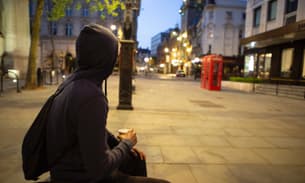
Big banks resume push for repossessions in wake of pandemic
A diabetic taxi driver who had seen his work disappear during the pandemic; a business owner who had “never been in such a difficult position”; and a mother who wept after a judge said the bank could take her home. These are just some of the people brought to court by their mortgage lenders in the past months.
The Bureau has found hundreds of mortgage possession cases in courts in England and Wales since the ban on enforcing home repossessions was lifted. Some were being pursued for as little as £1,000. This was despite explicit guidance from the Financial Conduct Authority (FCA), the regulator for financial services, that, due to the impact of the pandemic, lenders should only start court action as a last resort. The government has also said that no one should lose their home because of the pandemic.
In just under a third of the cases the Bureau witnessed, the impact of Covid-19 was raised in the courtroom. In many cases, the lender was granted a possession order anyway. Two people told the Bureau they were left feeling suicidal after the court session.
It appears some lenders are taking more action than others. In the four months immediately after the ban on bailiff repossessions was lifted at the end of May, the Bank of Scotland and Lloyds Bank – which are both part of the Lloyds Banking Group – appear to have brought a disproportionate number of claims. The two banks made up nearly 40% of all the mortgage lender claimants in 10 of the busiest courts, despite making up just 20% of the mortgage market.
The Bureau sent reporters to sit in possession hearings in 30 courts across England and Wales over two months, but found many lenders wanted the proceedings to remain secret. Lawyers acting on behalf of mortgage lenders repeatedly asked for our reporters to be excluded from hearings. And a trade association for the finance industry wrote to top justice officials raising questions about our reporting, citing “nervousness” about the “reputational risks” to banks.
Despite the setbacks, we logged the details of 115 mortgage possession hearings. We found:
Covid-19 was mentioned in 30% of the hearings we attended.
Nearly half of hearings ended in an outright possession order, leaving the lender open to evicting the homeowners. A further 30% resulted in what is called a suspended order – meaning the homeowner was vulnerable to eviction if they fell behind on payments.
It took an average of nine minutes (8.6) for a possession order to be granted.
The average homeowner was £7,900 in arrears, although one person got a suspended possession order for owing just £670.
In 81% of hearings the homeowner did not have any legal representation. In 78% of all hearings the defendant did not show up.
Lucy Powell, Labour’s shadow housing secretary, said: “The government promised nobody would lose their home because of coronavirus, but the safety net for homeowners was withdrawn while Covid-19 and its economic effects were still raging, and we’re starting to see the result.
“Combined with the thousands of renters already facing eviction, Conservative incompetence is creating a homelessness crisis this winter.”
Last resort
Earlier this year the FCA warned that repossessions should only happen as a “last resort”, saying: “Firms should consider carefully the potential impacts on customers of possession proceedings and consider whether it is appropriate”.
In court, the Bureau saw time and again how the pandemic had impacted mortgage-holders. This included a farmer whose earnings from renting out cottages had disappeared during the pandemic and a diabetic taxi driver who found himself earning just £17 in an eight-hour shift. The driver told the Bureau that he felt his mortgage company had no mercy: “They just want to grab the money.”
In a nondescript courtroom on the fifth floor of the glass-fronted Manchester Civil Justice Centre, Angela’s* voice shook as she addressed the judge. She tried to explain how she had always been employed until Covid-19 hit and her work dried up. She had just been through a custody battle with her ex-partner and her mental health was suffering, she explained.
Her last mortgage payment was in March 2020 and at the end of August this year her bank, TSB, brought a claim to court. She was £8,400 in arrears at the time. By the time the case came to court, Angela had started receiving universal credit and had managed to get a £4,000 loan from her father. Her solicitor explained to the judge that she was also willing to get a lodger into her spare room and said “it is hopeful her circumstances will change” over the coming weeks.
But the judge appeared unmoved, saying that no proposals had been put forward to clear the arrears. She granted a possession order. Outside, Angela wept.
Big players
As well as attending these cases in person, the Bureau collated the public details of more than 2,500 hearings across 10 of the busiest county courts in England and Wales. More than one in 10 was a mortgage case.
Lloyds Banking Group (which brings together several brands, including Lloyds, Bank of Scotland and Halifax) made up 38% of all mortgage hearings listed from those courts, meaning the group appeared to be responsible for almost twice the proportion of cases as their share of the mortgage market would suggest. The vast majority of those cases were from the Bank of Scotland; it made up 30% of all the possession cases the Bureau recorded that were brought by a mortgage provider.
Similar proportions of cases brought by these banks were logged by Bureau reporters in the hearings witnessed in person. In court, we recorded that Covid-19 was mentioned explicitly in a quarter of the Bank of Scotland cases. In one case that was adjourned, the defendant lost their job during the pandemic and fell into mortgage arrears. In another coronavirus-related case, a suspended possession order was made against a defendant who had previously always paid on time.
In response to the findings, Lloyds Group told the Bureau that as the UK’s largest lender it would expect to be bringing more cases than its competitors. It confirmed the majority of the group’s lending is done through Bank of Scotland. The group said in the two particular cases we put to it, it sought a suspended possession order – rather than an outright repossession – as a way to engage customers and had come to an agreement with both on a payment plan. It said that at the point it took customers to court they were, on average, 14 months behind on payments, and that more than 70% of those it took to court this summer had been in arrears before the pandemic.
A spokesperson from Lloyds Group told the Bureau: “We will do everything we reasonably can to support [customers] and only after we’ve exhausted all other options would we seek a possession order. We firmly believe repossession is a last resort. By working together, for every 100 customers who face difficulty, over 99 remain in their homes.”
The next most common lender was Santander, which accounts for 11% of the mortgage market but made up 23% of the mortgage hearings in our list. The bank told the Bureau repossession was “only ever a last resort” and said: “We stopped all repossession activity at the start of the pandemic and have made no compulsory repossessions since then. We did not restart any litigation at all until April 2021, several months after many other lenders.”
‘Reputational risks’
Lawyers for mortgage lenders regularly objected to the presence of Bureau journalists in courtrooms. In some cases, judges turned down the objections, but in others, journalists were told to leave.
The Bureau’s reporting project also came to the attention of UK Finance, a trade body for the finance and banking industry, which wrote to a senior judge questioning why Bureau reporters were attending possession hearings. In that email UK Finance said “media attention on possessions causes nervousness amongst mortgage lenders given the reputational risks”. The body also wrote to the Legal Education Foundation, which funded this Bureau project.
Asked why it had taken this step, UK Finance told the Bureau: “UK Finance did not object to journalists attending court proceedings, nor did we ever seek to have them excluded from court.
“All the communication we had with either the Bureau of Investigative Journalism or the courts was solely to seek clarification on the nature of the work and to offer our assistance if required. UK Finance offered its full support to the Bureau of Investigative Journalism during its investigation, including use of our industry data, which shows very low levels of possessions.”
UK Finance did not respond to a question about what it meant by the “reputational risks” to banks of reporters scrutinising these hearings.
Homeowners protected – but is it enough?
Compared with private rental tenants, mortgage holders were relatively well protected during the pandemic. Borrowers could apply for mortgage payment deferrals, allowing them to pause payments for up to three months, which could then be extended to a maximum of six months. Nearly 3 million mortgage payment deferrals were granted before the scheme ended in July. Possession hearings were paused for six months last year, lenders were told not to apply for warrants of possession until 1 April 2021, and a ban on bailiff-led evictions was in place until the end of May in England and the following month in Wales.
But there have been calls for more help. In September 2020, the right-leaning think tank, the Centre for Policy Studies, warned that the Support for Mortgage Interest programme – a government support scheme for homeowners in receipt of benefits – needed “urgent reform to support low-income homeowners through the crisis”.
The think tank noted that temporary changes to the scheme – such as shortening the waiting period and turning support into grants rather than loans – had been made in the wake of the 2008 financial crisis to prevent many losing their homes.
Loans turning dreams into nightmares
As well as mortgage arrears cases, our reporters logged a small number of possession cases brought by loan companies whose customers had used their homes as collateral. In one such case, the pandemic turned a man’s dream into a nightmare.
Michael, a director and writer, who asked we use only his first name, had been planning a big TV drama project. He had taken out a bridging loan of £600,000 with lender Social Money Ltd to buy a commercial property in which he also lived. Michael later extended the loan and put his 79-year-old mother’s townhouse up as security.
Then came the lockdown; filming was impossible and the project fell apart. Soon Michael was facing a debt of £1.4m. He says he offered to settle the debt by paying more than £800,000 but the loan providers refused and started court proceedings.
Michael told the court that his mother – who had lived in her home for 40 years – was critically ill and that he had been hospitalised that year for sickle cell anaemia. He asked the loan company’s lawyers: “Are you going to throw this elderly woman out of her house, or will you accept the settlement offer on compassionate grounds?” But a judge found in the lender’s favour and Michael’s property was repossessed. He is now living in bed and breakfast accommodation, and fears his mother could also face repossession. Social Money, the loan company involved, did not say whether it would take Michael’s mother to court.
He told the Bureau the ordeal had left him “almost suicidal … I’ve been deeply depressed and have been trying to find a way out of this, but [the debt collectors] won’t speak to us, so it’s extremely difficult.”
Social Money told the Bureau its extension of the loan “went above and beyond our standard terms and was made in goodwill” to allow Michael to try to finish filming. It said it offered a review of the repayment plan, but that Michael's offer of repaying £849,000 was effectively asking Social Money to write off £268,000 of debt. It said Michael was made fully aware of the terms of the loan before signing up.
Numbers rising steadily
While figures are still down compared with before the pandemic, the number of mortgage claims has been steadily increasing all year and the latest figures show they are at 58% of pre-pandemic figures.
In the month after the ban on bailiff-forced evictions was lifted in England, there were 307 warrants processed through the courts for mortgage lenders, and 34 repossessions took place. Experts warn the number of those falling into arrears may continue to increase steadily as the economic impact of the pandemic deepens.
Richard Harrison, of Homeowner Management Services, has seen mortgage holders struggling in recent months. The organisation regularly supports homeowners who are having issues with their mortgage lender. He told the Bureau that some were unaware that they needed to actively apply for mortgage holidays. Their arrears continued to grow and they are now facing court action.
Peter Tutton, head of policy, research and public affairs at StepChange Debt Charity, told the Bureau that one in five of their mortgage-holder clients is facing mortgage arrears as well as other debts. He said: “If the problem causing arrears is loss of income then the safety nets available are poor.” He warned that rising inflation may lead to an interest rate hike, leading to more unaffordable mortgages.
* Some names have been changed
Reporting team: Maeve McClenaghan, Charles Boutaud, Emiliano Mellino, Emma Bartholemew, Nathalie Raffray, Sabah Hussain, Tom Fair, Sam Baker, Reece Stafferton, Ruth Bushi, Shahed Ezaydi, Tommy Greene, Alexandria Slater, John Brace, Finn Oldfield, Patrick Ferrity, Michelle Ferguson, David Landau, Fatima Hudoon, Ben Fishwick, Rebecca Speare-Cole, Siriol Griffiths, Nick Thomas and Jacob Moreton
Community organiser: Eve Livingston and Emiliano Mellino
Bureau Local editor: Emily Wilson
Editor: Meirion Jones
Production editor: Katharine Quarmby, Frankie Goodway and Emily Goddard
Fact checker: Alice Milliken
Illustrations: Alice Mollon
This project is funded by the Legal Education Foundation. None of our funders have any influence over the Bureau’s editorial decisions or output.
-
Area:
-
Subject:





